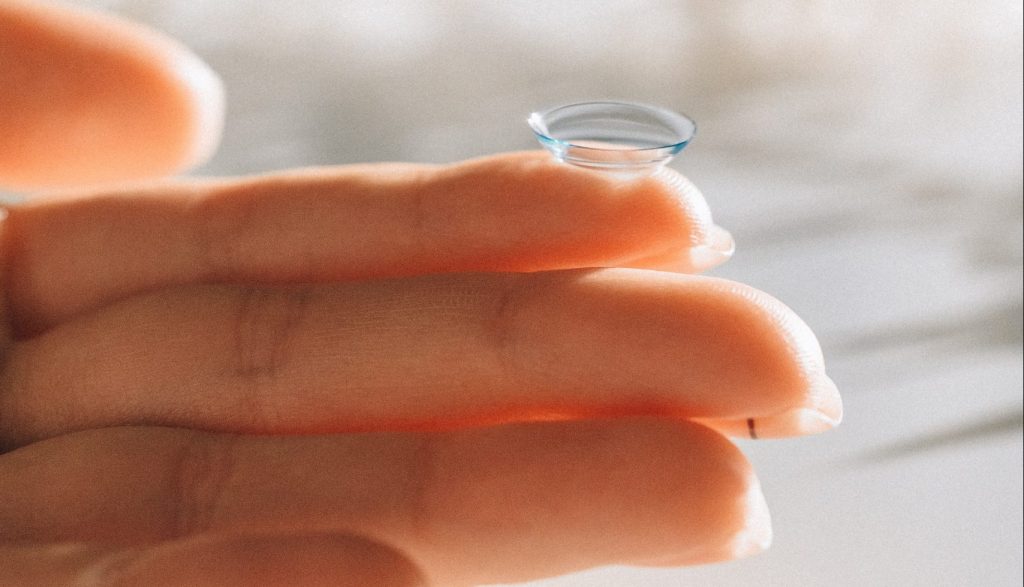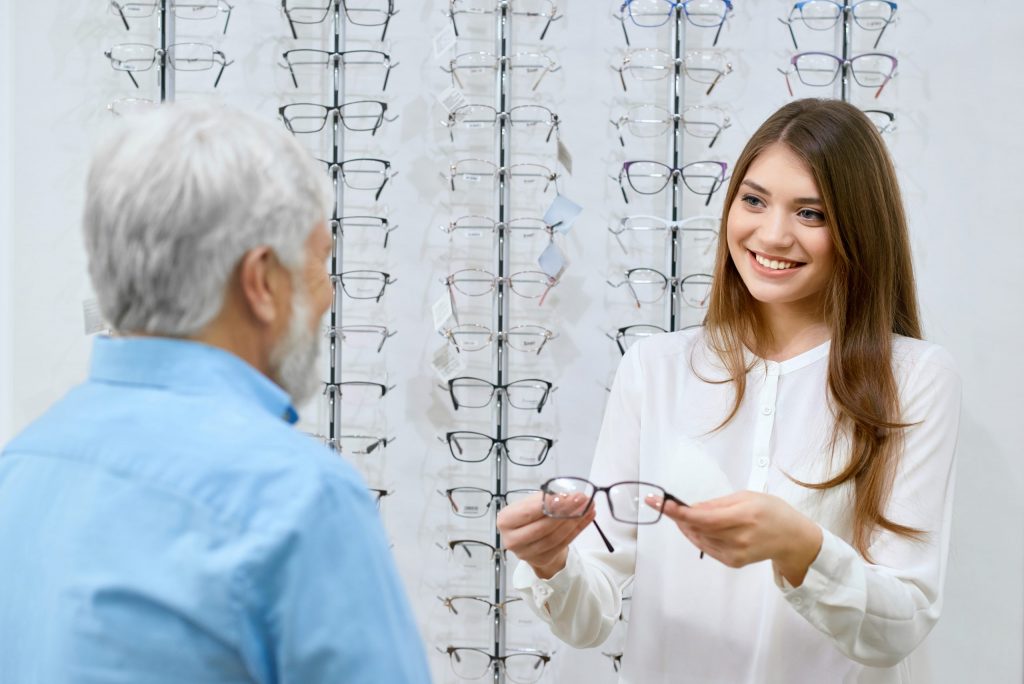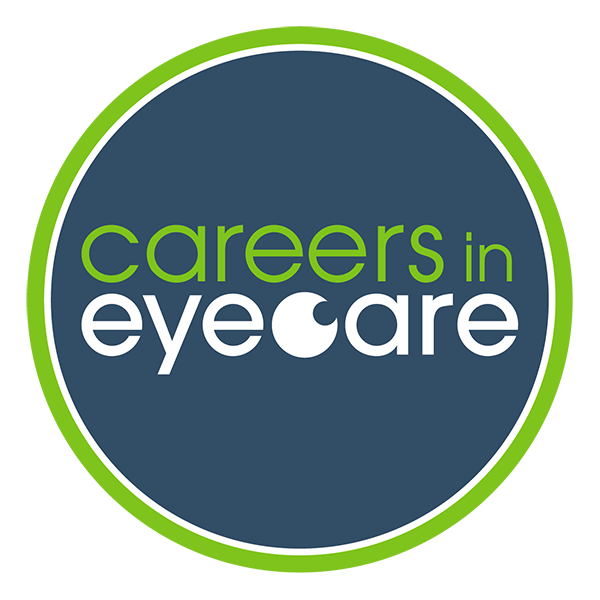I’ve been to the optician’s and it looks like it might be an interesting place to work. What are my options?
There are a number of people who work in an optical practice: the optometrist, the dispensing optician, and usually a number of optical assistants or receptionists. In some practices you will also find a laboratory where optical technicians make spectacles.
It’s very confusing when I go to the optician’s and I’m never quite sure who does what. Can you explain?
There are a number of people who work in an optical practice: the first person you will meet is likely to be the receptionist who can book your appointment. You may also meet an optical assistant in the front of the practice. They can assist you to choose frames and lenses and some may be trained to carry out initial assessments before your eye test.
The optometrist is the person who examines your eyes. They will then pass you on to the dispensing optician who is trained and qualified to offer the best advice on frames and lenses to suit your lifestyle and prescription.
In some practices you will also find a laboratory where optical technicians make spectacles. When you return to collect your new specs they may be fitted by the dispensing optician or an optical assistant.
What does an dispensing optician do?
A dispensing optician (DO) advises on, fits and supplies the most appropriate spectacles after taking account of each patient’s visual, lifestyle and vocational needs. Dispensing opticians also play an important role in advising and dispensing low vision aids to those who are partially sighted as well as advising on and dispensing to children where appropriate. They are also able to fit and provide aftercare for contact lenses after undergoing further specialist training. Career opportunities also exist to develop business skills in marketing and practice management.
Find out more about being a dispensing optician here.
How do I become a dispensing optician?
You can study ophthalmic dispensing in a number of ways, both full and part time, on day or block release which means that this career can suit those who want to work and study at the same time. There is are various full time, day release, distance learning, FD (two year) and BSc (three year) courses available at Anglia Ruskin University, Bradford College, ABDO College, City & Islington College and Glasgow Caledonian University.
Many people study through blended learning via ABDO College – involving block release, distance learning assignments, in-practice supervision and examinations through ABDO. At the end of the course you can achieve the ABDO Level 6 Diploma in Ophthalmic Dispensing (‘FBDO’) qualification required to become a dispensing optician registered with the General Optical Council.
Find out more about being a dispensing optician here.
Find out more about being a dispensing optician here.
What does an contact lens optician do?
A contact lens optician (CLO) is a specialist practitioner who is trained and qualified to fit, and provide aftercare for, patients with contact lenses. Contact lens opticians assess whether contact lenses meet the needs of the person, resolving clinical and tolerance issues, and remain responsible for clinical decisions enabling them to provide continuity of care. The contact lens speciality is open to dispensing opticians only and involves extra study and clinical practice. Once the specialist training is completed and competence assessed, practitioners must register their speciality with the General Optical Council. They are then able to perform additional duties to those of a dispensing optician.
Find out more about being a contact lens optician here.
Find out more about being a dispensing optician here.
How do I become a contact lens optician do?
Once you have qualified as a dispensing optician you can go on to study and specialise in fitting contact lenses. A Contact Lens Certificate course is run by ABDO College. This course is delivered by a method called ‘blended learning’ that consists of practice based learning, block release and distance learning coursework. You receive coursework material to work through and assignment questions to answer for each part of the course. There are 32 units of coursework to work through, one each week. A Personal Tutor will mark it for you and return it to you with feedback. As the course is at advanced level, you will also need to undertake some additional research and read around the subject in order to gain a thorough understanding of the subject. Block release is a one-week period of intensive study that will support you with your theory and practical studies and give you the chance to meet some of your fellow students. There are two of these block release periods in each year. Block release is held at ABDO College in Godmersham, Kent and it is a compulsory part of the course for all students.
While you are studying for your CL Cert you will be training in contact lens practice. You and your supervisor will be issued with a workbook to guide you both through this part of your training. You will learn practical skills from your Supervisor and work with patients in practice (under supervision) to perfect these skills. To become a contact lens optician, you will also need to complete a set number of case records that you build up over a one-year period and makes up a part of your final examinations.
The approved training course for the contact lens speciality is run by ABDO College and Bradford College.
Find out more about being a contact lens optician here.
Find out more about being a dispensing optician here.

What does an low vision optician do?
A low vision optician is a dispensing optician who has additional qualifications to support people who are blind or partially sighted, offering advice, assessment and relevant equipment to allow them to make the most of the sight that they have.
Find out more about being a low vision optician here.
How do I become a low vision optician?
ABDO College offer a Low Vision Honours course is for qualified dispensing opticians, contact lens opticians or optometrists that have a specialist interest in working with patients with low vision and who want to study further in this field. The theory course runs from January to July each year and includes a short period of intensive study (2-3 days) around Easter followed by theory examinations in the subsequent September and a practical exam after you have completed the required number of case records. Low Vision Honours prepares students for the ABDO Level 6 Diploma in The Assessment & Management of Low Vision.
The Low Vision Honours course is delivered by a method called ‘blended learning’ that consists of practice based learning, block release and distance learning coursework. You complete 23 units of coursework material and assignment questions for each part of the course. You then send your work to your Personal Tutor who will mark it for you and return it to you with feedback. As the course is at honours level, you will also need to undertake some additional research and read around the subject in order to gain a thorough understanding of the subject. You can expect this coursework to take you approximately 20 hours per week. Block release is a two-day period of intensive study that will support you with your theory and practical studies and give you the chance to meet some of your fellow students. There will be one of these block release periods in each year, normally at Easter. Block release is held at ABDO College in Godmersham, Kent and it is a compulsory part of the course for all students.
While you are studying the Low Vision Honours course you will also be working in practice as a registered dispensing optician and developing a significant level of experience in the assessment of patients with low vision. The opportunity to work in a hospital clinic setting or a rehabilitation centre would greatly enhance your experience and contribute appropriately to your learning in this specialist field. Fifteen case records that demonstrate assessment procedures, selection and fitting of low vision aids and an aftercare regime for a minimum of three months will need to be submitted to ABDO prior to practical examinations.
Find out more about being a low vision optician here.
Find out more about being a dispensing optician here.
What does an optical assistant do?
An optical assistant works under supervision in an optical practice to assist people with choosing frames and lenses. Some optical assistants also have training to allow them to carry out initial assessments before an eye examination such as autorefraction.
Find out about being an optical assistant here.
Find out more about being a dispensing optician here.
How do I become a optical assistant?
If you are interested in becoming an optical assistant, you need to apply for a position in an optical practice that offers on the job training. As you work you will be given the chance to study for a Optical assistant qualification via ABDO College.
Find out about being an optical assistant here.
Find out more about being a dispensing optician here.
What does an optical technician do?
An optical technician is trained and qualified to make or ‘glaze’ spectacles. They work in an optical lab which may be attached to an optician’s practice. They may also progress within industry to become senior management in optical manufacturing organisations.
Find out more about being an optical technician here.
Find out more about being a dispensing optician here.
How do I become a optical technician?
If you are interested in becoming an optical technician, you need to apply for a position in an optical lab that offers on the job training. As you work you will be given the chance to study for a qualification via ABDO College.
Find out more about being an optical technician here.
Find out more about being a dispensing optician here.
What does an optometrist do?
Optometry is the branch of healthcare that looks after the eyes, examining how well they function and whether there are any treatments that would help them to function more effectively. An optometrist examines eyes, tests sight and prescribes spectacles or contact lenses for those who need them. They also fit spectacles or contact lenses, give advice on visual problems and detect any ocular disease or abnormality, referring the patient to a medical practitioner if necessary. Look out for the qualification MCOptom. Most optometrists work in high street practice. Others work in hospitals or research departments. Some optometrists are involved in management, professional services roles in industry, training and education. With the ageing population and new treatments for eye disease putting pressure on the NHS optometry is expanding into roles traditionally the domain of ophthalmologists so optometrists may also share the care of patients who have chronic eye conditions with a medical practitioner. Once qualified, optometrists can undertake further training to specialise in certain eye treatment by therapeutic drugs.
Find out more about being an optometrist here.
Find out more about being a dispensing optician here.
How do I become a optometrist?
Optometrists study a three or four-year degree course at a university. There are ten universities that currently offer training in Optometry. After completing the degree, trainee optometrists need to go on to complete a pre-registration year where they practice under supervision of a qualified optometrist, write up case records and take further practical exams. All optometrists need to be registered with the General Optical Council.
Find out more about being an optometrist here.
Find out more about being a dispensing optician here.
What does an ophthalmologist do?
An ophthalmologist is a trained doctor who specialises in eyes.
Find out about being a ophthalmologist here.

How do I become a ophthalmologist?
Entry requirements for degree courses vary because each university sets its own entry criteria, but you are likely to need at least three A-levels, Highers, or equivalent qualifications at Level 3, plus supporting GCSEs including English, maths, and a science (usually biology or human biology).
Courses often specify preferred or essential A level, Higher, or equivalent subjects, such as biology and chemistry, with some schools preferring a third related science subject. It is important to check individual requirements with each university.
Find out about being a ophthalmologist here.
What does an ophthalmic nurse do?
An ophthalmic nurse has qualified as a nurse before going on to specialise in eyes. You will find them in a hospital eye clinic, providing care for people with eye diseases.
Find out more about being a ophthalmic nurse here.
How do I become a ophthalmic nurse?
Entry requirements for nursing degree courses vary because each university sets its own entry criteria, but you are likely to need at usually three A-levels, Highers, or equivalent qualifications at Level 3, plus supporting GCSEs including English, maths, and a science (usually biology or human biology).
Courses often specify preferred or essential A level, Higher, or equivalent subjects, such as one science (for example biology) or social science (for example psychology). Some universities offer courses with a foundation year for those without the necessary entry qualifications.
Find out more about being a ophthalmic nurse here.
What does a orthoptist do?
An orthoptist specialises in investigating, diagnosing and treating defects of binocular vision and abnormalities of eye movement. You will find most orthoptists working in a hospital setting, helping children who have squint or lazy eye (amblyopia).
Find out more about being a orthoptist here.
How do I become a orthoptist?
To become an orthoptist, you require an undergraduate degree in orthoptics. You can find out more about the course, including where you can study, here. The entry requirements vary for each university so please check their websites for more detail.
The general requirements are that you must have good GCSE Maths, English and Science grades and A levels/Highers or equivalent, with at least one science subject such as Biology, Maths, Physics or Chemistry. Alternative qualifications are considered and mature students are welcome to apply.
If you do not have the relevant academic background, there are options to study a Foundation Year degree or Access to Higher Education Diploma in Science prior to commencing the Orthoptic degree. Further details about Foundation Year degrees can be found on the websites of the University of Sheffield and University of Liverpool.
Find out more about being a orthoptist here.
What does an eye clinic liaison officer do?
An ECLO is based in an eye clinic. They are there to talk to people who may be newly diagnosed with sight loss, and to help them get emotional and practical support from local voluntary organisations, health and social care. They can help you understand more about your eye condition.
Find out more about becoming a ECLO here.
How do I become a eye clinic liaison officer?
You will need a qualification in rehabilitation / nursing / occupational therapy / optometry or a significant other health and social care qualification, or experience of delivering support services at a similar level.
As part of the training for the role, you will need to undertake the RNIB and City, University of London ‘Eye Clinic Support Studies’ qualification.
Find out more about becoming a ECLO here.
What does an optical practice manager do?
Can you combine a passion for healthcare with a head for business? Have you got the people skills to support customers and a team? An optical practice manager is responsible for a team of people in an optical practice and for business growth.
You will need to be passionate about optics and clinically minded. Your focus will be on customer service as well as commercial aspects. Commercially minded, you will be familiar with key performance indicators (KPIs) and targets.
Find out more about being a optical practice manager here.
How do I become a optical practice manager?
Whilst there may not be any educational requirements, it is likely that you will have some previous management or supervisory experience.
Find out more about being a optical practice manager here.
What does an optical sales representative do?
Whilst there may not be any educational requirements, it is likely that you will have some previous experience in optics or sales. A qualification such as dispensing optician or contact lens optician may be required to represent lens or contact lens businesses.
Find out more about being a optical sales rep here.
How do I become a optical sales representative?
An optical sales representative is responsible for promoting the lens, frame or contact lens range of a manufacturer to optical practice owners.
Find out more about being a optical sales rep here.

